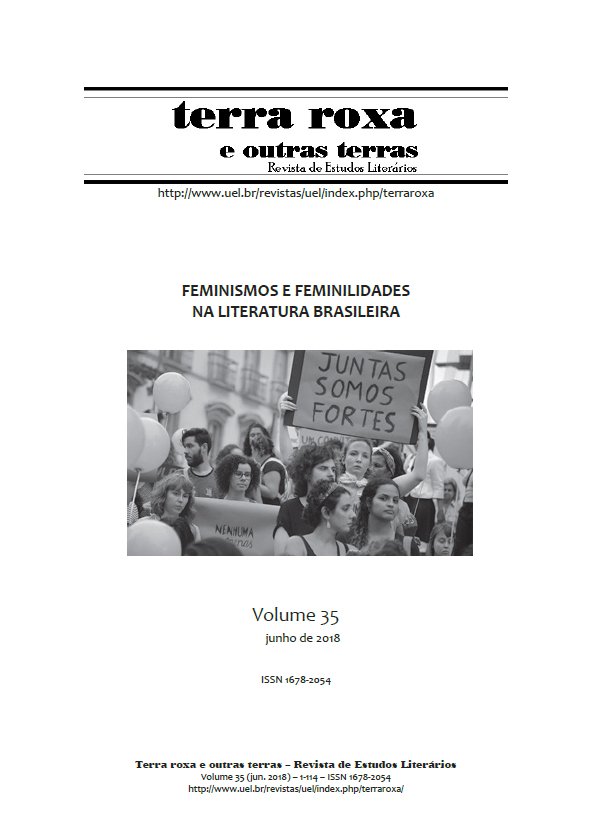Diana caçadora, the female resistance in the problematic heroine in Márcia Denser's novel
DOI:
https://doi.org/10.5433/1678-2054.2018v35p84Keywords:
Female narrative, Contemporary Brazilian fiction, Problematic heroin, ResistanceAbstract
The objective of this article is to study the protagonist character of Diana Marini as problematic heroine of the narratives that integrate Diana caçadora (2003). The problematic heroine differs from the classic heroes bring up by Lukács (2000) and Goldmann (1967), for owning and supporting authentic values in a deteriorate world. The protagonist created by Márcia Denser manifests in the sexual experiences the feminine resistance before the assimilated society and, as a manifestation of symbolic violence, naturalized patriarchal values. According to Regina Dalcastagnè (2012), the space for literature produced by women is small in a publishing market dominated by male authors, a factor that, according to Ruth Silviano Brandão (1989), let the woman see herself through the eyes of men. Thus, the transgressiveness of Denser's problematic heroine is in addition to other characters in the narrative of Brazilian feminine authorship of the 1970 and 1980 and, in relation to Nelly Novaes Coelho (1993), show us a change in the profile of women, such characters directly influence the female representational question.Downloads
References
BOSI, Alfredo. Narrativa e Resistência. Itinerários: Revista de Literatura. v. 10, pp. 11-27, 1996. Disponível em: http://seer.fclar.unesp.br/itinerarios/article/view/2577/2207, acesso em 20 set. 2017.
BOURDIEU, Pierre. A dominação masculina. Trad. de Maria Helena Kuhner. 2 ed. Rio de Janeiro: Bertrand Brasil, 2002.
BRANDÃO, Ruth S.. Passageiras da voz alheia. Lúcia Castello Branco & Ruth S. Brandão (orgs.). A mulher escrita. Rio de Janeiro: Casa Maria, LTC, 1989, pp. 17-20.
BUTLER, Judith. Problemas de gênero: feminismo e subversão da identidade. Trad. Renato Aguiar. Rio de Janeiro: Civilização Brasileira, 2003.
CANDIDO, Antonio. A personagem do romance. A personagem de ficção. 5. ed. São Paulo: Perspectiva, 1976, pp. 51-80.
COELHO, Nelly N. Dicionário crítico de escritoras brasileiras: 1711-2001. São Paulo: Escrituras, 2002.
COELHO, Nelly N. A literatura feminina no Brasil contemporâneo. São Paulo: Siciliano, 1993.
COLASANTI, Marina. A moça tecelã. Um espinho de marfim e outras histórias. Porto Alegre: LP&M, 1999, pp. 9-12.
DALCASTAGNÈ, Regina. Literatura brasileira contemporânea: um território contestado. Vinhedo: Horizonte, 2012.
DAVIS, Angela. Mulheres, raça e classe. Trad. Heci Regina Candiani. São Paulo: Boitempo, 2016.
DENSER, Márcia. Diana caçadora & Tango fantasma: duas prosas reunidas. Cotia: Ateliê Editorial, 2003.
GOLDMANN, Lucien. Sociologia do romance. Trad. Álvaro Cabral. Rio de Janeiro: Paz e Terra, 1967.
LUKÁCS, Georg. A teoria do romance: um ensaio histórico-filosófico sobre as formas da grande épica. Trad. José Marcos Mariani de Macedo. São Paulo: Duas cidades, 2000.
NIGRO, Cláudia M. C. Introdução. Cláudia M. C. NIgro & Juliane Chatagnier (orgs.). Literatura e gênero. São Paulo: Cultura Acadêmica,2015, pp. 15-22.
ROSENFELD, Anatol. Literatura e personagem. A personagem de ficção. 5. ed. São Paulo: Perspectiva, 1976, pp. 9-50.
SCHMIDT, Rita T.. Recortes de uma história: a construção de um saber fazer. Cristina Ramalho (org.). Literatura e feminismo: propostas teóricas e reflexões críticas. Rio de Janeiro: Elo, 1999.
STUDART, Heloneida. O estandarte da agonia. Rio de Janeiro: Nova Fronteira, 1981.
TELLES, Lygia F. As meninas. 5. ed.. Rio de Janeiro: José Olympio, 1973.
WOOLF, Virgínia. Um teto todo seu. Rio de Janeiro: Nova Fronteira, 2004.
Downloads
Published
How to Cite
Issue
Section
License
Copyright (c) 2019 Terra Roxa e Outras Terras: Revista de Estudos Literários

This work is licensed under a Creative Commons Attribution 4.0 International License.
Authors who publish in this journal agree to the following terms:
a) The authors retain the copyright and grant the journal the right of first publication, the work being simultaneously licensed under the Creative Commons Attribution-NonCommercial 4.0 International License, allowing the sharing of the work with acknowledgment of the authorship of the work and initial publication in this journal.
b) Authors are authorized to assume additional contracts separately, for non-exclusive distribution of the version of the work published in this journal (eg, publish in an institutional repository or as a book chapter), with acknowledgment of authorship and initial publication in this journal.
c) Authors are allowed and encouraged to publish and distribute their work online (e.g. in institutional repositories or on their personal page) after the editorial process, as this can generate productive changes as well as increase impact and citation of the published work (See The Effect of Open Access).
d) The authors of the approved works authorize the journal to, after publication, transfer their content for reproduction in content indexers, virtual libraries and the like.
e) The authors assume that the texts submitted for publication are of their original creation, taking full responsibility for their content in case of any objection by third parties.



















